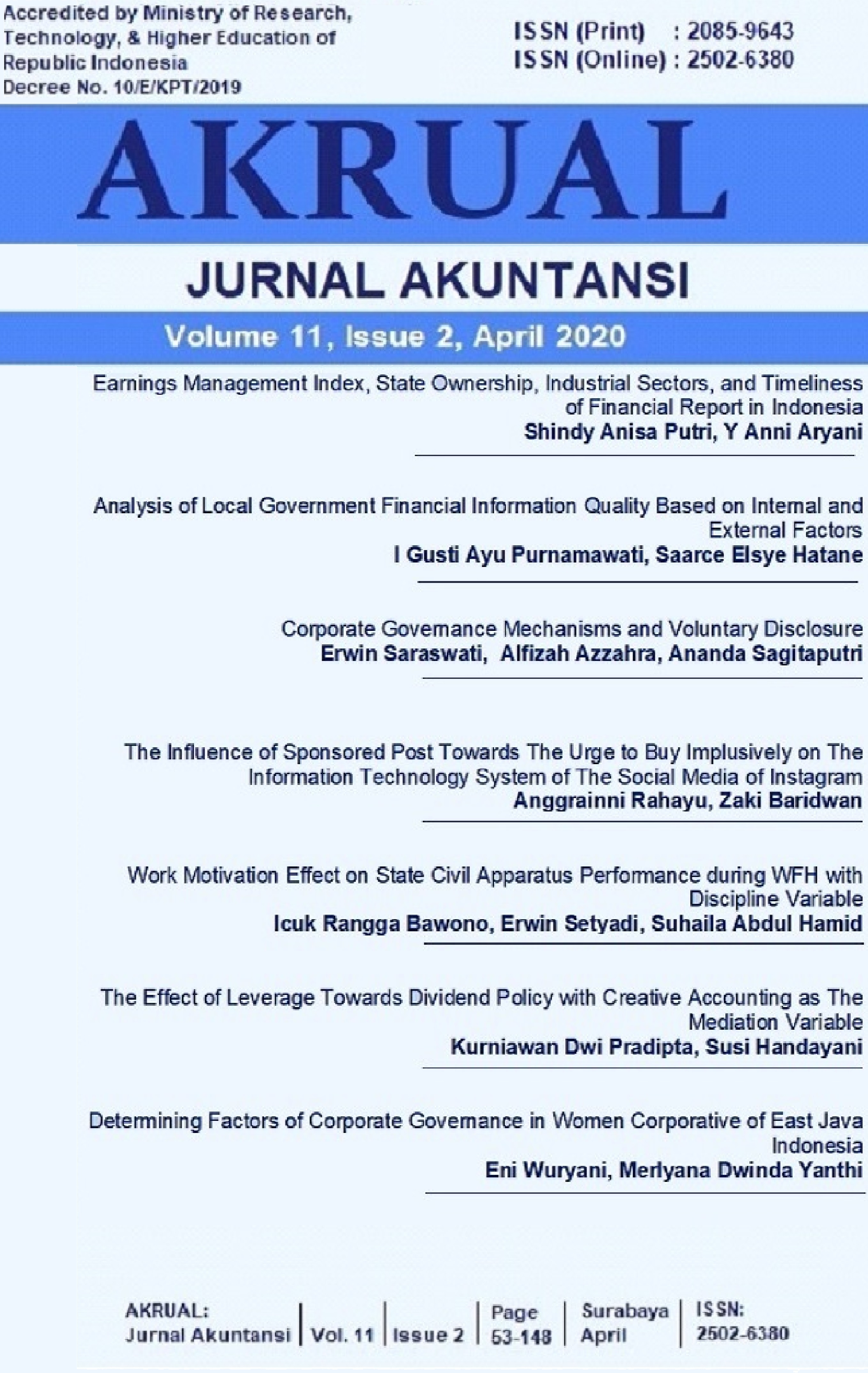Work Motivation Effect on State Civil Apparatus Performance during WFH with Discipline Variable
DOI:
https://doi.org/10.26740/jaj.v11n2.p110-121Keywords:
COVID-19, Discipline, Motivation, Performance, Work from HomeAbstract
Civil apparatus of the state should remain optimal in providing service to the community at the time of running work from home as a pandemic impact of Covid-19. Bureaucratic performance should also be maintained to ensure government programs can be directly perceived by the public. Governments are required to be able to apply flexible work patterns from two sides. That is flexible from the side of the work implementation, and flexible from the user side that in this case is the community. Despite working from home, the state civil apparatus is required to be able to provide optimal performance. This research seeks to see the motivation influence of state civil apparatus on their performance either directly or through disciplinary variables. Quantitative design has been adopted for this study using survey questionnaires prepared based on the Likert Scale (strongly disagree -1 and 5 to strongly agree). The sample size consists of 100 state civil apparatuses and is processed using PLS. The results of this study concluded that direct motivation does not affect performance, but indirectly through discipline, motivation can influence a significant effect at the overall performance of civil apparatus of the state
References
Bao, C., & Nizam, D. I. (2015). The Impact Of Motivation On Employee Performance In The Electronics Industry In China. International Journal of Accounting and Business Management. https://doi.org/10.24924/ijabm/2015.11/v3.iss2/29.45
Bernardin, H. J., & Russel, J. E. . (1993). Human Resourses management. New York: Mc Graw Hill Inc.
Bryman, A., & Bell, E. (2017). Business Research Methodology. Research Methodology.
Cairo, C. (2002). Motivasi dan Strategi Menentukan Tujuan Hidup dan Karir Anda. Prestasi Pustaka.
Dekawati, I., Suhendar, D., & Aji, A. I. (2019). Organizational Behavior and Work Disciplines (Their Effect on Work Achievement). https://doi.org/10.2991/icream-18.2019.78
Elvasusanti, E., Syamsudduha, S., & Rahman, U. (2019). The Effect of Madrasah Head Leadership Style and Work Motivation on Work Discipline of Madrasah Aliyah Teachers. Jurnal Ilmiah Ilmu Administrasi Publik. https://doi.org/10.26858/jiap.v9i1.9312
Endang, T., & Sari, E. (2019). The Effect Of Motivation And Discipline On Employee Performance At The Ministry Of Transportations Directorate Of Ports. Ilomata International Journal of Social Science. https://doi.org/10.26858/pdr.v2i1.13235
Idris, M. (2018). The Impact of Education and Training, Work Discipline and Organizational Culture on Employees Performance: The Study of Disaster Management and Fire Department in Palembang City, Indonesia. International Journal of Human Resource Studies, 8(3), 1. https://doi.org/10.5296/ijhrs.v8i3.13013
Inaray, J. C., Nelwan, O. S., & Lengkong, V. P. K. (2016). Pengaruh Kepemimpinan dan Motivasi Kerja terhadap Kinerja Karyawan pada PT. Amanah Finance di Manado. Jurnal Berkala Ilmiah Efisiensi, 16(2), 459470.
Iyer, R., Hanke, J. E., & Reitsch, A. G. (1989). Business Forecasting. The Statistician. https://doi.org/10.2307/2349022
Kurniawan, Harry, H. (2019). Effect of Work Discipline and Work Environment on Employee Performance with Work Motivation as an Intervening Variable in Department of Tourism , Youth and Sport of Padang District. Archives of Business Research, 7(7), 88101.
Liyas, J. N., & Primadi, R. (2017). Pengaruh disiplin kerja terhadap kinerja karyawan pada bank perkreditan rakyat. Al Masraf: Jurnal Lembaga Keuangan Dan Perbankan. https://doi.org/10.1016/j.nanoen.2012.08.008
Macquarrie, J. (2001). Postmodernism in philosophy of religion and theology. International Journal for Philosophy of Religion. https://doi.org/10.1007/978-94-010-0516-6_2
McClelland, D. C. (1985). How motives, skills, and values determine what people do. American Psychologist. https://doi.org/10.1037//0003-066x.40.7.812
Mohamud, S. A., Ibrahim, A. A., & Hussein, J. M. (2017). The effect of motivation on employee performance: Case study in Hormuud company in Mogadishu Somalia. International Journal of Development Research.
Robbins, S., & Judge, T. (2009). Organizational Behaviour: Concepts, Controversies, Applications. In Development.
Sunarsi, D. (2018). Pengaruh Gaya Kepemimpinan, Motivasi dan Disiplin Kerja terhadap Kinerja Pendidik Yayasan Marvin. INOVASI. https://doi.org/10.32493/inovasi.v5i1.y2018.p1-18
Sushil. (2014). Duality of enterprise and stakeholders on flexibility front. Global Journal of Flexible Systems Management, 15(3), 179180. https://doi.org/10.1007/s40171-014-0072-y
Sushil, P. (1997). Flexible systems management: An evolving paradigm. Systems Research and Behavioral Science, 14(4), 259275. https://doi.org/10.1002/(sici)1099-1743(199707/08)14:4<259::aid-sres159>3.0.co;2-l
Uno, B. H. (2014). Teori Motivasi & Pengukurannya. Personnel Review.
Weiner, B. (1985). An Attributional Theory of Achievement Motivation and Emotion. Psychological Review. https://doi.org/10.1037/0033-295X.92.4.548
Wibowo. (2011). Manajemen Kinerja. In Raja Grafindo Persada.
Downloads
Additional Files
Published
How to Cite
Issue
Section
 Abstract views: 1839
,
Abstract views: 1839
, PDF Downloads: 1143
,
PDF Downloads: 1143
, PDF Downloads: 0
,
PDF Downloads: 0
, PDF Downloads: 0
PDF Downloads: 0


















